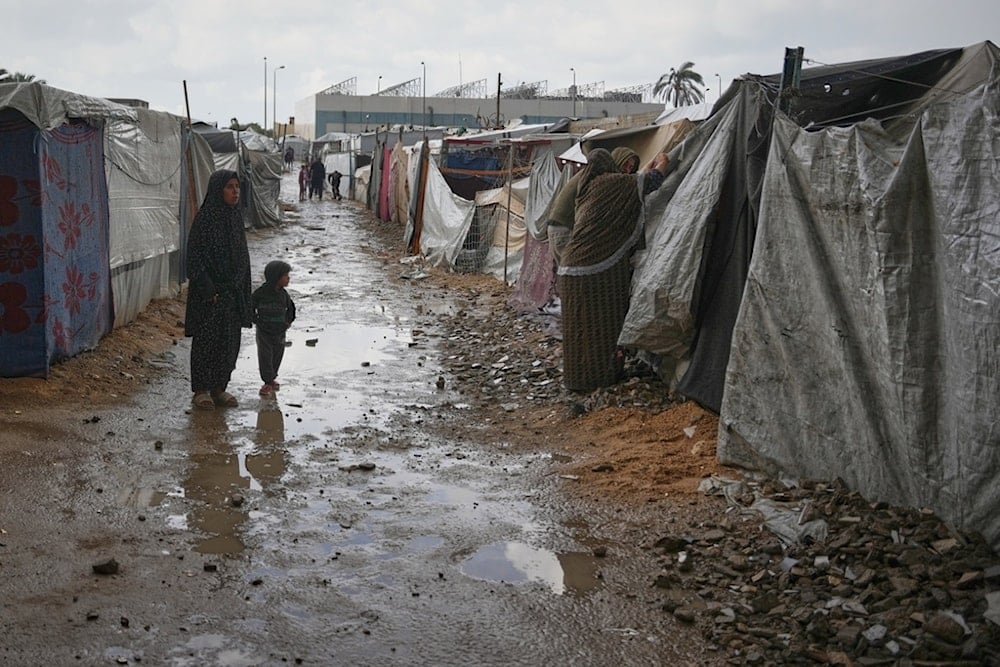EU to consider training 3,000 Gaza police under Trump's plan
EU foreign ministers will review a proposal to train and deploy 3,000 Palestinian police officers in Gaza as part of Trump's disputed 20-point plan, a strategy critics say entrenches external control while "Israel" continues to violate the truce.
-

Hussein and Khawla Abu Arabiya adjust their tent to protect the interior from a rainstorm at a temporary camp in Deir al-Balah, in the central Gaza Strip, on Friday, Nov. 14, 2025 (AP)
European Union foreign ministers are set to examine a proposal next week that would position the bloc at the forefront of efforts to train 3,000 Palestinian police officers, with the long-term objective of sending them to Gaza. The plan is detailed in an internal paper reviewed by Reuters on Friday.
The document, drafted by the EU’s diplomatic service ahead of the ministers' meeting on November 20, explores ways the bloc could help advance a 20-point Gaza strategy put forward by US President Donald Trump.
Although "Israel" and Hamas endorsed the first stage of that strategy in October, uncertainty remains over when or whether the remaining components will be carried out, especially as "Israel" continues to violate the truce on a daily basis.
Since the ceasefire took effect in early October, Gaza authorities and multiple monitoring bodies report near-daily Israeli attacks, including shelling, drone strikes, and live fire, resulting in hundreds of Palestinian casualties during what is nominally a "truce."
Contested Trusteeship
Trump's so-called 20-point plan itself remains contentious. The blueprint centers on a ceasefire and captives exchange but also imposes a new political and security architecture on Gaza, including the exclusion of Hamas Resistance from governance, the creation of an unelected "technocratic" Palestinian committee, and the establishment of an international so-called "Board of Peace" empowered to oversee reconstruction, security benchmarks, and border arrangements.
Critics argue the plan effectively places Gaza under an externally managed trusteeship led by the United States and its allies, delaying any meaningful discussion of Palestinian statehood and the universal right to self-governance, conditioning basic rights and reconstruction on strict security compliance.
The proposal also separates Gaza from the larger Palestinian question, reinforcing political fragmentation while granting "Israel" broad discretion to suspend or reverse commitments on the basis of alleged non-compliance.
EU Security Expansion
As part of its assessment, the European External Action Service outlines potential expansions to the EU’s two civilian missions operating in the Palestinian territories. These missions currently assist with border management and support the Palestinian Authority’s policing and judicial reform efforts, a model that has long been criticized by Palestinian civil society groups for entrenching donor-controlled security structures without addressing occupation, sovereignty, or accountability.
According to the paper, the EU’s police mission could "take leadership in training the Palestinian police force in Gaza by providing direct training and support to approx. 3,000 Palestinian police officers (on the PA pay-roll) from Gaza, with a view to training the full 13,000 Palestinian police force."
If implemented, this would extend the West Bank’s donor-designed security-coordination framework into Gaza, raising concerns among analysts that the force may become more answerable to external agendas than to the needs and rights of Palestinians living under siege.
The document also mentions the possibility of broadening the EU’s civilian border-monitoring operation in Rafah so it could function at additional crossing points. Such an expansion would place the EU in a central role in managing Gaza’s borders, a core sovereign function, at a moment when the enclave’s future governance and legal status remain unsettled.
Fragile Consensus
Despite these options, it remains unclear if EU governments are ready to commit to such an expanded role. Several member states have expressed unease about assuming security responsibilities in a territory still under occupation and subject to continuous violations of the ceasefire.
The debate comes as diplomatic tensions grow: on Thursday, Russia circulated its own draft UN Security Council resolution on Gaza, challenging Washington’s push for a competing US-backed text that would endorse President Trump's plan, further complicating the international landscape surrounding Gaza’s immediate and long-term future.
Read more: 25 oil‑exporting states tied to 'Israel’s' genocide in Gaza: Report

 4 Min Read
4 Min Read









